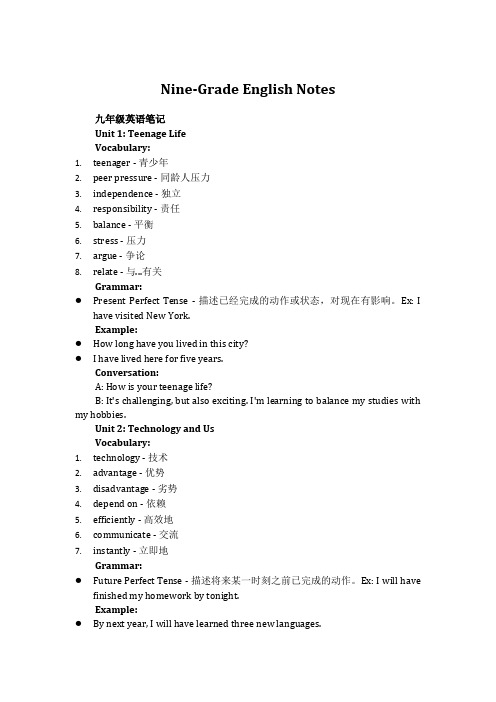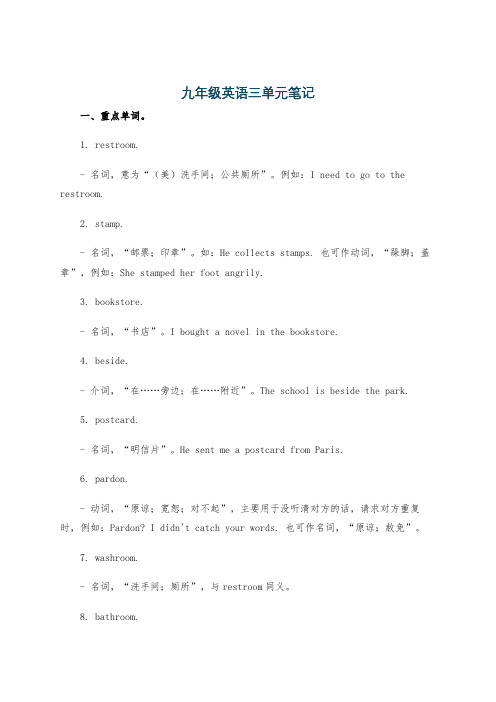九年级英语笔记
九年级上册英语课文笔记

九年级上册英语课文笔记Section A.1. 单词部分。
- textbook (n.) 课本;教科书。
例句:We need to bring our textbooks to class.- conversation (n.) 交谈;谈话。
常用搭配:have a conversation with sb.(与某人交谈),例如:I had a great conversation with my teacher yesterday.- aloud (adv.) 大声地;出声地。
区别于loud(adj. 大声的,多用来修饰名词,如a loud voice)和loudly(adv. 喧闹地,往往带有嘈杂的意味)。
例如:Read the text aloud, please.2. 短语和句型。
- by + doing 通过做某事。
这是一个非常重要的表达方式。
例如:You can improve your English by reading English books.- make mistakes 犯错。
mistake是可数名词,常用搭配还有make a mistake。
例如:Everyone makes mistakes when they learn something new.- It's + adj. + for sb. + to do sth. 对某人来说做某事是……的。
例如:It's important for us to learn English well.3. 语法。
- 一般现在时的用法回顾。
在描述经常发生的动作、客观事实或真理时使用。
例如:He often goes to school by bike.(经常发生的动作);The earth goes around the sun.(客观真理)Section B.1. 单词。
- patient (adj.) 有耐心的;n. 病人。
九年级全一册英语笔记

九年级全一册英语笔记1. Unit 1: Personal Information- Vocabulary: name, age, nationality, occupation, hobbies, etc.- Grammar: to be verb, present simple tense, question words, possessive adjectives, etc.2. Unit 2: School Life- Vocabulary: subjects, teachers, classmates, school facilities, school rules, etc.- Grammar: past simple tense, adverbs of frequency, comparative and superlative forms, conditional sentences, etc.3. Unit 3: Everyday Activities- Vocabulary: daily routines, leisure activities, household chores, etc.- Grammar: present continuous tense, simple future tense, imperative sentences, etc.4. Unit 4: Food and Nutrition- Vocabulary: food and beverage items, cooking methods, nutritional information, etc.- Grammar: countable and uncountable nouns, quantifiers, modals of possibility, etc.5. Unit 5: Health and Fitness- Vocabulary: body parts, common illnesses, healthy habits, exercise routines, etc.- Grammar: present perfect tense, passive voice, modal verbs of advice and obligation, etc.6. Unit 6: Media and Communication- Vocabulary: media platforms, types of communication, social media, etc.- Grammar: reported speech, indirect questions, phrasal verbs, etc.7. Unit 7: Travel and Tourism- Vocabulary: transportation, tourist attractions, travel documents, accommodation, etc.- Grammar: past continuous tense, present perfect continuous tense, unreal conditionals, etc.8. Unit 8: Environment and Ecology- Vocabulary: natural disasters, climate change, pollution, endangered species, etc.- Grammar: passive voice, causative verbs, reported questions, etc.9. Unit 9: Culture and Society- Vocabulary: traditions, customs, festivals, cultural values, etc.- Grammar: relative clauses, gerunds and infinitives, connectives, etc.。
九年级英语笔记

Nine-Grade English Notes九年级英语笔记Unit 1: Teenage LifeVocabulary:1.teenager - 青少年2.peer pressure - 同龄人压力3.independence - 独立4.responsibility - 责任5.balance - 平衡6.stress - 压力7.argue - 争论8.relate - 与...有关Grammar:●Present Perfect Tense - 描述已经完成的动作或状态,对现在有影响。
Ex: Ihave visited New York.Example:●How long have you lived in this city?●I have lived here for five years.Conversation:A: How is your teenage life?B: It's challenging, but also exciting. I'm learning to balance my studies with my hobbies.Unit 2: Technology and UsVocabulary:1.technology - 技术2.advantage - 优势3.disadvantage - 劣势4.depend on - 依赖5.efficiently - 高效地municate - 交流7.instantly - 立即地Grammar:●Future Perfect Tense - 描述将来某一时刻之前已完成的动作。
Ex: I will havefinished my homework by tonight.Example:●By next year, I will have learned three new languages.Conversation:A: How do you think technology has changed our lives?B: It has made communicating easier, but it also makes us dependent on devices.Unit 3: Environmental ProtectionVocabulary:1.environment - 环境2.pollution - 污染3.conserve - 保护4.recycle - 回收5.sustainable - 可持续的6.ecosystem - 生态系统Grammar:●Conditional Sentences (Type 2) - 描述与现在事实相反的情况。
九年级人教版英语学习笔记完整版

九年级人教版英语学习笔记Document serial number【NL89WT-NY98YT-NC8CB-NNUUT-NUT108】Unit1Howcanwebecomegoodlearners1、How引导的特殊疑问句:①询问方式或手段:“怎样”如:HowdoyoustudyEnglish?---Istudybyreadingaloud.②用于彼此间打招呼、问候、询问身体状况:如:Howdoyoudo---HowdoyoudoHowareyou---I’mfine/well/Ok.③询问天气或程度:如:How’stheweather=What’stheweatherlike?----It’ssunny/cloudy/raining.④询问年龄:如:Howoldisshe=What’sherage?---Sheis15(yearsold)⑤征求意见或建议用:Howabout=Whatabout+n/代词/V-ing.如:Howabout_______(play)basketball?⑥询问频率用:Howoften如:Howoftendoyouexercise---Onceaday.⑦询问可数名词的数量用:Howmany如:Howmanystudentsarethereinyourclass?---Thereare50studentsinourclass⑧询问不可数名词的数量用:Howmuch.如:Howmuchmeat____(be)thereinthefridge?---Onlyalittle.此外:Howmuch还可以用于询问价格。
Howmuchisyourcoat---It’s50yuan.注:询问价格用:Howmuchis/aresth=What’sthepriceofsth东西有贵(expensive=dear)贱(cheap=inexpensive),价格(price)有高(high)低(low)如:Thiscoatisverycheap. Thepriceofthiscoatisverylow.⑨询问次数用:Howmanytimes“多少次”如:Howmanytimesdoyougototheparkaweek?----Threetimes.⑩询问长度、时间长短用:Howlong如:Howlongistheboat----About3meters.Howlongwillyoustaythere?---For2days注:用Howlong提问,用:For+时间段或since+时间点回答(其中,for可以省略)。
九年级英语上册笔记知识点

九年级英语上册笔记知识点一、Unit 1 How can we become good learners?1. 重点单词。
- aloud:出声地;大声地。
例如:read aloud大声朗读。
- pronunciation:发音;读音。
注意其动词形式是pronounce。
- patient:有耐心的;n.病人。
be patient with sb.对某人有耐心。
- discover:发现;发觉。
强调发现原本存在但不为人知的事物。
- secret:n.秘密;秘诀;adj.秘密的。
the secret to………的秘诀。
2. 重点短语。
- by working with friends通过和朋友一起学习。
by+doing表示“通过某种方式”。
- make word cards制作单词卡片。
- listen to tapes听磁带。
- ask the teacher for help向老师求助。
- read aloud to practice pronunciation大声朗读来练习发音。
3. 重点句型。
- How do you study for a test?你是如何为考试而学习的?- I study by making flashcards.我通过制作抽认卡来学习。
- The more you read, the faster you'll be.你读得越多,你(阅读速度)就会越快。
(“the+比较级,the+比较级”结构,表示“越……,就越……”)4. 语法知识点。
- by的用法:- 表示方式、方法,意为“通过……;靠……;用……”,后接名词、代词或动名词。
例如:He makes a living by selling newspapers.他通过卖报纸为生。
- 表示时间,意为“到……为止;不迟于”,常与完成时连用。
例如:By the end of last month, we had learned 2000 English words.到上个月末为止,我们已经学了2000个英语单词。
九年级上册英语书笔记

九年级上册英语书笔记一、Unit 1 How can we become good learners?(一)重点单词。
1. textbook:n. 教科书;课本。
- 例如:Our textbooks are very useful for our study.(我们的课本对我们的学习非常有用。
)2. conversation:n. 交谈;谈话。
- 常构成短语“have a conversation with sb.”(与某人交谈),例如:I had a great conversation with my teacher yesterday.(我昨天和我的老师进行了一次很棒的交谈。
)3. aloud:adv. 大声地;出声地。
- 区别于“loud”(adj. 大声的)和“loudly”(adv. 喧闹地)。
“aloud”侧重于发出声音,让别人能听到,常与“read”搭配,如:Read aloud so that everyone can hear you.(大声朗读以便每个人都能听到你。
)4. pronunciation:n. 发音;读音。
- 例如:His pronunciation is very good.(他的发音非常好。
)5. sentence:n. 句子。
- 可以说“make a sentence”(造句),例如:Let's make sentences with these new words.(让我们用这些新单词造句吧。
)(二)重点短语。
1. by working with friends:通过和朋友一起学习。
- 在回答“How do you study for a test?”(你如何为考试而学习?)时可以说:I study by working with friends.(我通过和朋友一起学习。
)2. make word cards:制作单词卡片。
- 这是一种学习单词的有效方法,例如:I make word cards to help me remember new words.(我制作单词卡片来帮助我记住新单词。
初中英语九年级学霸笔记

初中英语九年级学霸笔记
以下是一份初中英语九年级的学霸笔记,供您参考:
1. 词汇和短语
掌握常用的动词、名词、形容词和副词等词汇,如“develop”,“culture”,“successful”,“enthusiastic”等。
熟记常用的短语和习惯表达,如“make a difference”,“keep up with”等。
2. 语法
掌握简单句、复合句和并列句的构成和用法,以及各种时态和语态的用法。
了解虚拟语气、非谓语动词和定语从句等高级语法知识。
3. 阅读理解
提高阅读速度和理解能力,掌握常用的阅读技巧,如略读、跳读和细读等。
积累阅读中遇到的生词和短语,提高词汇量。
4. 写作
学习写作技巧,如开头、结尾、段落展开和语言表达等。
多写多练,积累常用的写作模板和句型,提高写作水平。
5. 听力
提高听力理解能力,掌握常用的听力技巧,如预测答案、定位关键信息和
筛选无关信息等。
多听英语材料,如新闻、电影、电视剧和公开课等,提高英语语感。
6. 口语
提高口语表达能力,学习常用的口语表达方式和流利度。
多参加英语角、口语练习伙伴等英语交流活动,提高口语实际应用能力。
总之,初中英语九年级的学霸笔记应该包括词汇和短语、语法、阅读理解、写作、听力和口语等方面的内容。
通过不断的学习和实践,可以提高英语水平。
九年级英语三单元笔记

九年级英语三单元笔记一、重点单词。
1. restroom.- 名词,意为“(美)洗手间;公共厕所”。
例如:I need to go to the restroom.2. stamp.- 名词,“邮票;印章”。
如:He collects stamps. 也可作动词,“跺脚;盖章”,例如:She stamped her foot angrily.3. bookstore.- 名词,“书店”。
I bought a novel in the bookstore.4. beside.- 介词,“在……旁边;在……附近”。
The school is beside the park.5. postcard.- 名词,“明信片”。
He sent me a postcard from Paris.6. pardon.- 动词,“原谅;宽恕;对不起”,主要用于没听清对方的话,请求对方重复时,例如:Pardon? I didn't catch your words. 也可作名词,“原谅;赦免”。
7. washroom.- 名词,“洗手间;厕所”,与restroom同义。
8. bathroom.- 名词,“浴室;洗手间”,可指家中的卫生间。
9. normal.- 形容词,“正常的;一般的”。
It's normal to feel nervous before an exam.10. rush.- 动词,“仓促;急促”,例如:Don't rush, or you may make mistakes. 也可作名词,“仓促;匆忙”,如:in a rush(匆忙地)。
11. suggest.- 动词,“建议;提议”,常见用法有suggest doing sth.(建议做某事),例如:I suggest going for a walk. 还有suggest + that从句(从句中谓语动词用should+动词原形,should可省略),如:He suggests that we (should) start early.12. staff.- 名词,“管理人员;职工”,单复数同形。
- 1、下载文档前请自行甄别文档内容的完整性,平台不提供额外的编辑、内容补充、找答案等附加服务。
- 2、"仅部分预览"的文档,不可在线预览部分如存在完整性等问题,可反馈申请退款(可完整预览的文档不适用该条件!)。
- 3、如文档侵犯您的权益,请联系客服反馈,我们会尽快为您处理(人工客服工作时间:9:00-18:30)。
Unit 1 How can we become goodlearners?Section A1.ask…for 请求,询问,向…要eg He asked me politely for the book.ask sb (not) to do sth 叫某人(不)做某事2.by prep. 通过…靠…(后接Ving)eg She learns English by English magazines.3.conversation cn 交谈,会话(have conversations with sb)eg I’ll have a long conversation with her.4.aloud adv. 出声地,大声地(常与read,think,cry,shout等连用,表示让人能听得见)loud adj/adv 响亮的/地,大声的/地(指发音音量大或声音穿得远,做adv 时常与speak,talk, laugh等连用)loudly adv. 大声地(表示声音高且喧闹、不悦耳或令人感到讨厌,常与knock,ring,crow连用)eg Look at the sign---“No one is allowed to read aloud in the library.He makes loud noise.Someone knocked loudly at the door.5.practice v. 练习,操练(practice doing sth)practice un 实践,练习,锻炼eg He practices playing football.Practice makes perfect.6.too+adj/adv原形+to+V原形=so+adj/adv原形+that从句=not+adj/adv原形+enough+to+V原形eg He is too young to go to school.=He is so young that he can’t go to school.=He isn’t old enough to go to school.7.spoken English 英语口语eg His spoken English is not so good as his written English.8.quickly adv. 快地,迅速地(指具体的动作迅速敏捷,也指思维反应快)fast adj/adv 快的/地(指物体或人的运动速度快,也指说话快)soon adv 快速地(指动作完成或离现在的时间间隔短)eg Come quickly,something terrible has happened.She drives very fast.My father will leave for Beijing soon.9.word by word 逐字地day by day 日复一日one by one 逐个10.patient adj 有耐心的,耐烦的(be patient with/to…对…有耐心)n 病人eg We all like Mr.Smith.He is very patient with us.The nurse is looking after the patient.11.not…everything 表示部分否定,could not understand everything “并非每件事都能理解”当every,all,always等表示整体意义的词与not连用时,表示部分否定eg I didn’t find everyone on the playground.Not all balls are round in the USA.12.secret cn 秘密,机密(keep a secret保密;in secret秘密地)adj 秘密的,隐秘的eg Exercising every day is the secret of health.It’s a secret passage.13.look up (在字典或资料中)查找;向上看,仰视eg I’ve forgotten the number,you should look it up again.They looked up,and found many locusts.14.repeat =do or say…again15.take a note/take notes 记笔记16.memorize v 记忆,记住(指有意识地用心地去记,强调主观的动作过程memory nremember v 记得(指某件事或印象在记忆里,一般不需要有意识地去记忆便可以想起)eg She tried to memorize every event.She remembered event that happened in these years.17.be afraid of doing sth 担心而害怕做某事be afraid to do sth 怕而不敢做某事eg The girl was afraid to go across the bridge,for she was afraid of falling downfrom it.Section B1.increase to 增到,增加到(后+总数)eg The population of this city has increased to 3,000,000by now.increase by 以…的幅度增加,增加了…eg The population of this factory increased by 10 percent last year.2.at the speed of 以…速度at top/full/high speed 高速,全速eg Your taxi traveled at the speed of 80 miles an hour.It’s dangerous to turn round the corner at high speed.3.be born 出身于be born with 天生具有…be born to do sth 天生能做某事eg He was born in a small village.Her cousin brother was born with a mole(胎记) on the shoulder.Man was born to cry,so it’s with other animals.4.have the ability to do sth 有能力做某事eg Jenny is the first person for the job,she has the ability to communicate.5.take an interest in=be interested in 对…感兴趣lose interest in 对…失去兴趣eg She seems to take an interest in discussing the trip.He has lost interest in fishing.6.create v 创造,创建,创作creative adj 创造性的,有创意的creation n 创造,创建7.It’s +adj +for sb to do sth 对某人来说做某事是……It’s +adj +of sb to do sth (adj是表示情感,特征的词:kind ,nice ,good ,silly ,wrong ,wise等) eg It’s hard for you to finish it.It’s kind of you to say so.8.pay attention to 注意…留心…(to是介词,后接n/pron/Ving)eg Your spoken English is a little poor.Please pay attention to it.As you see,Sam didn’t pay much attention to watching TV.9.connect…with…把…和…连接起来connect…to…把…连上eg First,the light is connected to a switch.Don’t connect the matter with what happened last week.10.even if =even though即使,纵然eg I wouldn’t give up even if I should fail a second time.I can still remember even though it happened so long ago.11. unless=if…not…如果不,除非eg You’ll be late unless you hurry.=You’ll be late if you don’t hurry.Unit 2 I think mooncakes are delicious!Section A1.a little too 太……一点eg Kevin was a little too young to dress himself.2.put on 增加(体重)发胖+weight穿上,戴上+衣物eg Last month,Joan put on some weight.Mr.Weevers put on his hat and hurried out.3.pound cn 重量单位“磅”.货币单位“英镑”eg two pounds of milkAfter the Sichuan earthquake,the British government gave away1,000,000 pounds.4.shoot down 击落,击毁eg An US UA V was shot down in Iran last year.5.try to do sth 尽力做某事(但不一定成功).try doing sth 尝试做某事eg She tried to climb onto the bank(河岸),but failed.You always travel by train,why not try taking a bus for a change?6.steal 偷,窃取(stole stolen). steal sth from 从……偷某物eg The child stole a book from the shelf..have sth stolen 某物被偷eg She had her purse(钱包)stolen.7.so……that……如此……以至于…….so+adj/adv+that从句.so+adj+a/an+单数名词+that从句.so+many/few+复数名词+that从句.so+much/little+不可数名词+that从句eg He is so young that he can’t go to school.He made so many mistakes that he failed the exam..such……that……如此……以至于…….such+a/an+单数名词+that从句.such+复数名词/不可数名词+that从句.such+a/an+adj+n+that从句.such+adj+复数名词/不可数名词+that从句eg He is such a good student that we all believe him.It was such bad weather that we had to stay at home.y v 平放,放置(lay out 摆开,布置)产卵,下蛋eg Mrs,Turner laid out the flowerpots in her garden.How strange it is to see the hen lay two eggs a day!lie----lying----lay----lain 躺,位于lie----lying----lied----lied 撒谎lay----laying----laid----laid 平放,产卵9.admire vt 欣赏,观赏(admire sth 欣赏某物)Vt 钦佩,羡慕(admire……for……因……而钦佩……)eg Standing on the top of the mountain,you can admire the beauty of the whole city.We admire Ann for her courage.10.tie cn 领带(a shirt and tie). v 拴,扎,系,绑(tie…to…将…拴到…)eg It’s formal(正式)to wear a shirt and tie if you go to a party.Please tie your dog to the tree.11.感叹句的种类How引导的感叹句(1)How+adj+主语+谓语!(2)How+adv+主语+谓语!(3)How+adj+a/an+单数名词+主语+谓语!(4)How+主语+谓语!eg How blue the sky is!How well she danced that day!How interesting a book it is!How time flies!What引导的感叹句(1)What+a/an+单数名词+主语+谓语!(2)What +不可数名词+主语+谓语!(3)What+复数名词+主语+谓语!(4)What+a/an+adj+单数名词+主语+谓语!(5)What+adj+不可数名词+主语+谓语!(6)What+adj+复数名词+主语+谓语!eg What a horse it is!What fun it was!What colors they are!What a nice girl she is!What fine weather it was last week!What silly questions they are.Section B1.trick cn 恶作剧,闹剧(play a trick on sb 捉弄某人)eg The kids played tricks on Harvey when he was young.2.treat cn 招待,款待v 对待,把…看作(treat…as…把…看作…) eg It’s my treat.Don’t treat his words as a joke.3.dress up as+sb 装扮成某人dress up in+服装或颜色穿上…eg The kids are dressing up as pirates(海盗)Father Christmas often dresses up in red.4.mean adj 小气的,吝啬的,自私的(be mean with…对…吝啬)v 意味着,意欲mean doing sth 意味着做某事mean to do sth 打算做某事not mean to do sth 不是有意做某事eg Mr.Marley was mean with almost everything.That would mean wasting a lot of labor.Really?I don’t mean to waste any labor.I don’t mean to be late ,sir.5. business un 商业,生意.un 职责,事务,事(on business 出差).cn 商铺,商店eg Sometimes,business English is hard to learn.Mr.Wang has gone to Hainan Island on business.She has a business in Paris.5.punish sb for (doing) sth 因为(做)某事而处罚某人eg He was punished for breaking the school rules.6.warn sb of sth 警告某人某事warn sb (not) to do sth 警告某人(不)做某事warn sb +that从句eg We’ve warned the kids of the risk of electricity.We’ve been warned not to go out these days.I warned her that snakes are dangerous.7. end up doing sth 最终成为…结果为…eg I didn’t like it at first,but we ended up cheering.end up with 以…告终eg Their game ended up with a quarrel.7.present un 现在,目前(at present).cn 礼物赠品.adj 现在的,目前的.出席的,到场的eg At present,everything goes well.My uncle sent me an iPad as a birthday present.What do you think of your present company,David?The present guests were all in high spirit.8.spread v/n 传播,蔓延eg The fire spread in a short time.China has successfully controlled the spread of bird flu.(禽流感)9.hiding n 躲藏,隐藏处(in hiding 躲藏着;go into hiding 躲起来)eg Tom and his sister went into hiding when they heard the sound of their mother’s footsteps.10.hunt n 搜索,搜寻(hunt for)eg The hunt for the sunk ship(沉船) continue11.not only…but also…不但…而且…(连接两个相对称的并列成分,若连接两个主语时要实行就近原则)eg Not only Mr.lin bt also his son loves the movies.Unit 3 Could you please tell me wherethe restrooms are?Section Armation un 消息(表示通过打听、学习、观察等方式获得的资料).news un 新闻,消息(指人们感兴趣的或近来发生的事情,尤指通过广播、电视、报纸等事情).message cn 消息,口信(指口头或书信传递给他人的消息)eg We need some information.He often sends me short messages.We listen to the news on the radio.2.Could you please+V原形…….?请你…….好吗?.Could you please not+V原形……? 请你不要……好吗?(其回答中不能用could,只能用can.即Yes,I can.或No/Sorry,I can’teg Could you please be here a little earlier?Sorry,I can’t.3.beside prep 在旁边,在附近=next to/close tobesides prep 除…之外还…eg A girl is standing beside the tree.Dis anyone else come besides Jack?4.get sb sth=get sth for sb(get是“买到,弄到,得到”之意)eg Who’d like to get some chalk for me?=Who’d like to get me some chalk?5.pardon v 原谅(主要用于没听清对方说话时,恳请对方再说一遍).excuse me 打扰一下(主要用于吸引别人的注意,有麻烦或打扰之意所做之事可能会使别人不愉快或不方便,诸如插话、失陪、提出请求、纹路等)eg Can I ask you some questions?Pardon?Excuse me,can you tell me where the bank is?6.need v 需要(实义动词)need to do sth 需要去做某事need doing sth 需要被做某事eg Harold needed to bring drinks.Potatoes need cooking a little longer.7.suggest v 使人想到,使人联想,提议,建议suggest sth (to sb)=suggest (to sb) (向某人)提议/建议…suggest doing sth 提议/建议做某事suggest +that从句(虚拟语气,其谓语用should+动词原形,should常被省略)eg What did you suggest to the manager?I suggested going home at once.I suggest (that) we go out to eat.8. psaa by 经过,路过,从…旁边经过.go by 流逝,过去eg He passed by without greeting me.Time goes by.8.宾语从句(2)类型①连词that引导的宾语从句由陈述句转化而来,that无意义,that可省略eg I think (that) she’ll be back soon.He didn’t know (that) his brother was also there.that在下列情况中不宜省略主句与宾语从句间有插入语eg She said here,in her letter,that she was getting on well with her studies.出现两个或以上的宾语从句,此时只有第一个that可以省略,其余的不能省略eg Danny told me (that) he would go to Canada and that he had been there once.②连词代词who,whom,what,which,whose和when, where,why,how等引导的宾语从句由特殊疑问句转化而来,这些连接代词或连接副词在宾语从句中充当某个成分,因此不能省略。
